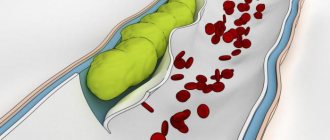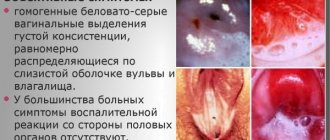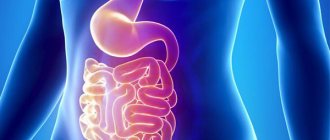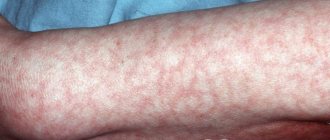What is irritable bowel syndrome
IBS is also called colon dyskinesia, since the syndrome manifests itself in impaired motility . In this case, there are no structural or biochemical disorders in the digestive organs. The disease is most often diagnosed in young people 20-40 years old, but it can occur even in infants.
Important! Due to the fact that the disease does not have specific symptoms, the patient is often treated for other pathologies, for example, dysbiosis.
IBS is as common in children as in adults . According to statistics, more than half of the patients seen by a doctor for recurrent abdominal pain have this diagnosis. Girls get sick most often, as they are more emotional.
Classification
Depending on the clinical manifestations, the following types of IBS are distinguished::
- with a predominance of constipation, while the feces are hard and excreted in small portions, therefore the pathology is also called spastic constipation;
- if loose stools predominate, they speak of nervous diarrhea, since diarrhea most often appears with excitement, irregularity, or stress;
- if the main symptom is flatulence, the pathology is called spastic colitis, mucoid colic;
- Mixed (or unclassified) IBS cannot be classified into any one type.
According to ICD-10, IBS is classified as an intestinal disease. It is designated by code K58 and is divided into two groups: IBS with diarrhea and without diarrhea.
Symptoms
IBS can occur with diarrhea and with a predominance of constipation (ICD 10: K58.0 and K58.9, respectively). Depending on the form of the pathology, symptoms vary.
Main (general) symptoms:
- Sharp pain in the intestines, subsiding after defecation;
- Bloating caused by excessive gas (flatulence);
- Constipation alternating with loose stools;
- Deteriorated general condition.
In addition to those described, extraintestinal manifestations are identified (sleep disturbances, sweating, rapid heartbeat, etc.).
Causes of IBS in children
Irritable bowel syndrome should be treated only after determining the cause of the disease . It has been noticed that in about a third of children, pathology occurs due to stress and anxiety. This could be an unfavorable family situation, worries and worries, sudden changes in lifestyle and daily routine. A teenager may develop IBS due to problems at school, changes during puberty, or before exams.
In another 30% of cases, the disease develops after an intestinal infection. But there are also other causes of IBS :
- hereditary predisposition;
- vegetative-vascular dystonia;
- poor nutrition, overeating or lack of fiber in food;
- endocrine pathologies;
- long-term use of antibacterial drugs, leading to disruption of intestinal microflora;
- in bottle-fed infants - an incorrectly selected formula;
- sedentary lifestyle, lack of sleep;
- helminthiases;
- birth injuries, perinatal encephalopathy.
Causes
The causes of the disease are not fully understood. Factors that trigger the occurrence of irritable bowel syndrome in children:
- Stressful situations. The slightest psycho-emotional stress in children with a certain predisposition leads to a malfunction of the gastrointestinal tract. This could be being late for school, anxiety before a test or exam, fear of inevitable punishment, the beginning of menstruation in girls, uncomfortable toilets in a strange place. There may be more global reasons - separation from mother, death of loved ones, sudden change in life.
- Poor nutrition is a reaction to rough, rich, fried food. In children under one year old, instead of natural products, vegetables and fruits that need to be chewed, ready-made jars of purees and cereals are introduced as complementary foods. As a result, the child’s body is not accustomed to digesting rough fiber, which leads to IBS.
- Individual intolerance to certain foods.
- Long-term antibiotic therapy leading to dysbacteriosis.
- Infectious diseases of the gastrointestinal tract.
- Imbalance of hormones that affect the motor and evacuation function of the intestine (in particular, motilin).
- Heredity - the syndrome was found in the parents of 33% of patients.
- Congenital or acquired change in the pain threshold of the intestine.
Pathogenesis
Under the influence of external psycho-emotional factors, the sensitivity threshold of the visceral receptors of the stomach and intestines changes. The body begins to react with pain to the slightest stretch of the intestines. Due to food, medicinal irritants and/or hormonal imbalances, intestinal motility accelerates or slows down, and the act of defecation is disrupted.
Increased sensitivity of receptors to changes in hormone levels in the blood can also provoke symptoms of IBS. As a result of stress, the level of enkephalins, proteins that have a morphine-like effect, changes. They act on opioid receptors in the colon, speeding up peristalsis and causing pain.
Due to long-term antibiotic therapy, food allergies, and infection of the body, dysbacteriosis occurs. Bacterial waste products cause disruption of the breakdown of proteins, fats and carbohydrates, inactivation of intestinal enzymes, which leads to enzymatic deficiency and impaired intestinal motility.
We invite you to read: Surgery to remove adenoids in children, modern adenotomy methods and possible complications
Irritation of receptors under the influence of various factors reflexively transmits a signal to the brain, activates the hypothalamic-pituitary system, causing compensatory reactions in the form of the release of biologically active substances into the blood and changes in the level of hormones in the blood, which aggravates symptoms. A vicious circle arises.
At-risk groups
The risk group includes children with lability of the nervous system, those who have experienced stress, from dysfunctional families, with a hereditary predisposition, who do not monitor their nutrition (in families where mothers are either not interested in their children or, due to excessive guardianship, cannot insist on a rational diet for the child) .
Classification
According to the international classification of diseases ICD-10, the disease proceeds:
- with a predominance of diarrhea - stool of a mushy consistency, frequency more than three times a day;
- without diarrhea (constipation) – stool has a hard consistency, frequency – no more than three times a week;
- in mixed form - the presence of stool of different consistency.
Symptoms
Pathology develops due to failures in the regulation of intestinal motility . This leads to the fact that in response to any irritation of its walls, for example, coarse or fatty foods, pain occurs. The peculiarity of such sensations is that they occur when it is necessary to empty the intestines, and then pass. The pain can be aching or sharp, cramping.
Other symptoms of pathology also appear:
- strong, uncontrollable urge to defecate, pain and discomfort during the process itself;
- change in stool consistency: from liquid to “sheep feces”;
- violation of the frequency of bowel movements;
- slow digestion, loss of appetite;
- the occurrence of nausea, heartburn, belching;
- increased gas formation, development of flatulence, feeling of bloating, heaviness.
Reference . All symptoms are clearly expressed only during the day; during sleep they decrease. Typically, a child experiences pain after breakfast.
Prevention
Experts are inclined to believe that IBS is a condition that cannot be prevented . You can only influence a process that has already begun - to soften the course of the disease and eliminate irritating factors.
- If a child complains about the digestive system, immediately visit a gastroenterologist ;
- Frequent complaints of abdominal pain or problems with bowel movements in a child are a reason to keep a food diary . The child’s menu with meal times should be entered there. After each meal, it is better to record any symptoms and complaints that have arisen - this will help the doctor make a diagnosis during the visit;
- When you consult a doctor, you can jointly create an individual menu , which will exclude foods that provoke the development of IBS. The doctor will determine which foods should be excluded from the diet completely, and which foods are acceptable in this case;
- Conducting psychotherapeutic sessions is one of the measures to prevent IBS in school-age children and adolescents. In this case, you can contact a school or family psychologist to agree on the advisability of treatment.
- Doctors whose consultation is necessary if you suspect IBS are a gastroenterologist and pediatrician.
|
|
Features of the course of the disease
A child is diagnosed with irritable bowel syndrome if discomfort during bowel movements and abdominal pain occur more than three times a month and this condition lasts longer than three months.
Depending on age, the manifestations of pathology may differ:
- In infants, the disease most often manifests itself as pain and cramps in the abdomen. Colic often occurs in newborns as a reaction of the intestines to new food. But they usually go away by three months. If spasms appear a year or later and are associated with a change in the daily routine or the psychological state of the child, we can talk about IBS. In addition to colic, this pathology is also manifested by the presence of mucus and streaks of blood in the stool.
- In children of preschool and primary school age, irritable bowel syndrome most often occurs due to stress and poor diet. In addition to pain, they experience heartburn and indigestion. Sometimes the pathology is accompanied by frequent urination or urinary incontinence.
- Extraintestinal manifestations of the disease are often observed in adolescents Headaches, rapid heartbeat, sweating, insomnia, and increased fatigue occur. Mood changes, irritability and anxiety appear.
Psychotherapy
The child also trains to control bowel function (relaxation techniques, NLP, Gestalt therapy techniques, Ericksonian hypnosis using resource trances).
In order to normalize relationships with others and create “good weather in the house,” the child learns conflict-free communication and constructive problem solving. (interpersonal therapy). She undergoes family psychotherapy sessions with her loved ones.
The duration of psychotherapy depends on the stage. If a child has been hospitalized with a diagnosis of “acute abdomen,” short-term therapy is provided in the hospital. After discharge, course therapy is carried out for up to 6 months with a frequency of 1–2 times a week.
Diagnostics
It is difficult to make a correct diagnosis in children . Usually, with such complaints, organic diseases of the digestive system, helminthiasis or intestinal infection are first excluded.
For this purpose the following studies are carried out:
- blood chemistry;
- stool analysis for blood and worm eggs;
- bacterial sowing;
- coprogram;
- analysis for dysbacteriosis;
- Ultrasound of the abdominal cavity;
- endoscopic examination of the digestive organs;
- assessment of rectal motor function using manometry.
When diagnosing pathology in infancy, the child’s type of nutrition, heredity , and rate of weight gain are taken into account. Typically, the diagnosis is made based on the mother's information about symptoms and examination, excluding organic and inflammatory diseases.
When a child can talk about his feelings, it is easier to make a diagnosis. The disease is diagnosed by symptoms that last for at least three months.
In adolescence, a child can hide his feelings, so IBS is not always diagnosed on time. Usually the appearance of the syndrome is associated with poor diet and stress. Teenagers often need to consult a psychotherapist.
Diagnosis of IBS
Diagnosis of the syndrome
Important! To detect the disease, you will have to undergo more than one examination; making a diagnosis is not so easy.
You will need consultation from many specialized specialists: neurologist, gastroenterologist, pediatrician, proctologist, endocrinologist. To begin with, other pathological processes in the digestive system should be excluded.
It is necessary to undergo studies that are included in the diagnostic protocol:
- laboratory study of biochemical blood parameters,
- examination of stool for the presence of occult blood,
- undergoing examination for the presence of helminthiasis,
- coprogram
- bacterial examination of stool,
- determining the presence of intestinal dysbiosis.
Among the instrumental diagnostic methods are:
- sigmoidoscopy,
- ultrasonography,
- gastroduodenoscopy,
- biopsy,
- x-ray using barium.
Only after irritation is detected is treatment prescribed. The stomach should be treated only on the recommendation of a doctor.
Treatment
The symptoms and treatment of irritable bowel syndrome are related. There is no specific therapy; all methods are used taking into account clinical manifestations. Usually the treatment is complex. The following methods are used :
- medications;
- physiotherapy;
- folk remedies;
- diet;
- correction of regime and lifestyle.
Drugs
Any medications should be used in children only on the recommendation of a doctor. Typically, several medications from different groups are prescribed depending on the symptoms:
- Antispasmodics help relieve spasms and pain: “No-shpa”, “Buscopan”, “Duspatalin”.
- Probiotics are needed to normalize the intestinal microflora: “Bifidumbacterin”, “Linex”, “Acipol”.
- Prokinetics improve motor function: Domperidone, Motilium.
- Enterosorbents, for example, Smecta, help relieve symptoms of flatulence. Espumisan is also prescribed for this purpose.
- For constipation, laxatives are used, most often lactulose-based products.
- For diarrhea - intestinal antiseptics and enterosorbents. Sometimes Loperamide is prescribed, which helps reduce intestinal motility.
Physiotherapy
Physiotherapeutic procedures help improve intestinal motility . To relieve it during cramps and diarrhea, electrophoresis, mud applications, and acupuncture are used. If intestinal motility is reduced, electrical stimulation, massage, and darsonvalization are needed.
Dietary supplements and herbs
Not all medications can be used by young children . In addition, IBS is not accompanied by organic disorders, so symptoms can be relieved with herbal remedies. Dietary supplements with chamomile and fennel are used to help with gas formation and cramps. There are also dietary supplements based on probiotics: “Narine”, “Bifiform”.
Folk remedies
Decoctions of herbs that have antispasmodic and anti-inflammatory effects are used (oak bark, chamomile, string, St. John's wort, mint, licorice root). For constipation, you can eat flax seeds, lingonberry juice, and dried fruits. Rice water and jelly help with diarrhea.
Diet
Diet is the main method of treatment; in the initial stages, it is possible to cope with the disease only by changing the diet and diet.
It is necessary to consume more fiber, exclude fast food and foods that cause gas , limit sweets and confectionery. The child should eat a balanced diet, in small portions several times a day. Overeating and prolonged hunger should be avoided.
Clinical guidelines
Dr. Komarovsky recommends starting to treat irritable bowel syndrome in children without the use of medications . First you need to normalize your diet and lifestyle: ensure sufficient physical activity and normal sleep. You should also improve the psychological climate in the family and protect the child from stress.
Psychotherapy
Since exacerbation of the disease is often associated with the psycho-emotional state of the child , psychotherapy is effective. A psychologist helps to cope with the fear of attacks, teaches how to overcome stress and relax.
Treatment methods
IBS therapy is carried out in several directions. Parents of children with similar symptoms are advised to reconsider their child's diet. The following products should be excluded:
- cabbage;
- legumes;
- grape;
- limit the consumption of sweets and baked goods.
It is also important to create a menu according to the symptoms that arise. For example, children with a tendency to constipation include beets, oatmeal, boiled vegetables, prunes, and fermented milk products in their diet. For kids with diarrhea, rice water, dryers, crackers, and starch jelly are recommended. It is recommended that children under one year old be given milk formulas with probiotics and prebiotics.
READ ALSO: how and with what is constipation treated in a three-year-old child?
Drug treatment of IBS is symptomatic. The following types of drugs are used:
| Type of IBS | Antispasmodic | Enzymes | Probiotics | Drugs that normalize the activity of the gastrointestinal tract | Antidepressants |
| Pain and increased gas production |
|
|
|
| Amitriptyline |
| Diarrhea | |||||
| Constipation | – |
|
|
Possible complications and prognosis
The disease must be treated . Despite the fact that it is not considered dangerous, and the symptoms in most cases go away on their own, the pathology can lead to the development of complications. They usually appear only with age. This could be intestinal obstruction, colitis, dysbacteriosis. Hemorrhoids or anal fissures often appear. Due to malabsorption, vitamin deficiency and anemia develop.
Irritable bowel syndrome is not a dangerous disease, but without treatment it becomes chronic and greatly reduces the patient’s quality of life. In addition, IBS can cause the development of more serious pathologies of the digestive system and vitamin deficiency.
Classification of IBS
There are several types of IBS:
- With a predominance of constipation;
- With the presence of loose stools (diarrhea);
- With predominant flatulence;
- Mixed type.
With IBS and diarrhea, the child does not have bowel movements at night. Attacks occur mainly in the morning. The process of defecation occurs several times in a row with a short break.
In cases where constipation predominates in irritable bowel syndrome, stool may be irregular and change consistency; pain is periodic or constant.
Constipation can be replaced by diarrhea and vice versa. Such conditions are characterized by: bloating, the presence of mucus fragments in the feces, vomiting, belching with a sour odor, disturbances in the psycho-emotional state (anxiety, increased fatigue, irritability).
Types of intestinal infections
All intestinal infections, depending on the pathogen, are divided into bacterial, viral and caused by parasitic organisms.
Bacterial intestinal infections
Caused by microbes belonging to bacteria. Pathogens can be pathogenic or opportunistic. The first include bacteria that are not normally present in the human body, for example, typhoid bacillus, Vibrio cholerae, etc. Opportunistic pathogens are those microorganisms that are normally present in the human intestines in small quantities, and therefore do not cause any harm. However, if they multiply or enter the intestines from the outside in large quantities, they become pathogenic and provoke the development of the disease. An example of this is Staphylococcus aureus.
Viral intestinal infections
These include: enterovirus, rotavirus, adenovirus, coronavirus and other infections. They are caused by viruses entering the intestines, which can cause inflammation of the intestinal mucosa. Most often, rotavirus and enterovirus intestinal infections occur in people of different ages. A person who has suffered such a disease remains a source of infection for another two to three weeks after recovery.
Protozoal intestinal infections
Giardiasis, amoebiasis, etc. They are much less common than others, and infection usually occurs when ingesting contaminated water, for example, when accidentally swallowing it while swimming. Unlike previous intestinal infections, protozoal infections can last longer and require treatment with special antiprotozoal drugs.
If an intestinal infection develops in a child of the first year of life, he should definitely be hospitalized in the hospital, since critical dehydration in children under one year of age can occur too quickly and lead to serious complications, including death.
Prevention and prognosis
Prevention of the disease consists of proper nutrition and the correct use of pharmacological agents. In addition, it develops in the complete exclusion of any adverse mental impact on the child.
The prognosis of the disease is favorable. With timely treatment, it is possible to completely get rid of the symptoms of the pathological process.
Valeria Petrova | 04/09/2015 | 444
Valeria Petrova
9.04.2015 444
Irritable bowel syndrome is unpleasant because it leads to a sharp decrease in the child’s quality of life. Let's look at its symptoms and treatment methods.
By the way, various serious diseases can be disguised as irritable bowel syndrome (IBS), so if suspicious symptoms appear, you must definitely visit a doctor and conduct all the necessary research.
In children, irritable bowel syndrome can have three main clinical forms: with a predominance of constipation; with a predominance of diarrhea; with a predominance of pain and flatulence.
Symptoms of IBS
This disease has the following symptoms:
- abdominal pain or discomfort (passes after a bowel movement);
- change in stool frequency (it can be quite frequent - more than three times a day, or, on the contrary, rare - only a few times a week);
- change in stool shape (loose stool, sheep feces, etc.);
- feeling of incomplete bowel movement;
- flatulence;
- rumbling in the stomach;
- frequent belching.
You should be wary if, in addition to the above symptoms, the following are observed: you find blood in your stool; the child has a fever; sudden weight loss; Abdominal pain does not go away even after defecation.
Diseases such as ulcerative colitis may have similar symptoms to irritable bowel syndrome; bowel cancer; Crohn's disease.
As a rule, children do not experience abdominal pain at night. Symptoms of irritable bowel syndrome may worsen when a child experiences extreme stress, such as anxiety about exams or tests.
Causes of Irritable Bowel Syndrome
It must be said that the specific causes of this intestinal disorder have not yet been identified. Doctors believe that a combination of certain factors can lead to IBS:
- heredity;
- features of early child development (presence of intestinal infections in the first year of life);
- severe stress and excessive workload at school;
- abuse of flour products, chocolate, etc.
- character traits (the child is too impressionable, experiences all grievances inside, without expressing emotions);
- hormonal changes during puberty;
- intestinal infections.
Treatment of irritable bowel syndrome
Of course, treatment for irritable bowel syndrome should be comprehensive. It will be prescribed by a doctor after examinations and tests (after ruling out dangerous diseases).
plays an important role in successfully solving the problem . Parents should keep a diary in which they need to record the foods eaten by the child during the day, and his well-being after eating this or that food. This way you can figure out which foods cause discomfort and pain.
Here are the main dietary recommendations:
- If your child has irritable bowel syndrome with constipation , you should enrich his diet with foods rich in fiber, such as vegetables and grains; exclude milk, sweets and flour products.
- If IBS is accompanied by diarrhea , then you should exclude foods that increase intestinal motility: legumes, cabbage; Vegetables should be consumed only boiled and stewed.
Any form of IBS requires eating about 4-5 times a day. Snacking on the go or in a hurry is unacceptable: this leads to disruption of normal motility of the gastrointestinal tract.
If a child lives in a state of stress, this will certainly negatively affect the course of irritable bowel syndrome. Therefore, try to create as calm an atmosphere as possible at home, and if there is an urgent need, seek help from a psychologist.
One of the most common pathologies of the digestive system is irritable bowel syndrome in children, or IBS. In this condition, there is a disorder of the functions of the gastrointestinal tract, the main symptom of which is a violation of defecation, accompanied by pain.
Compared to the vast majority of pathologies, irritable bowel syndrome is not a consequence of an organ defect. This pathology combines a complex of symptoms related to the disruption of various intestinal functions. For this reason, the pathology can be classified as functional. Irritable bowel syndrome occurs in more than half of children, while the prevalence of this disease among adults ranges from 15 to 25%.
Prevention of pathology development
It is known that it is impossible to take preventive measures to exclude the development of irritable bowel syndrome in children. However, there are ways to eliminate the cause of the pathology or reduce symptoms, including:
- If a child is concerned about symptoms associated with the functioning of the gastrointestinal tract, then it is necessary to urgently seek advice from a gastroenterologist. Only a doctor can make an accurate diagnosis.
- It is necessary to record what and at what time the child eats, and how this affects his general condition and the manifestation of symptoms associated with the functioning of the gastrointestinal tract. This must be done for 2 or 3 weeks. This will allow you to adjust the child’s diet if necessary and avoid possible problems.
- It is necessary to consult a doctor and create an individual diet for the child. This will allow you to exclude from the diet foods that contribute to the activation of symptoms of irritable bowel syndrome in a child.
- In certain cases, therapy is recommended for schoolchildren and adolescents to combat stress. In such a situation, hypnosis or cognitive behavioral therapy may be used. But in such a situation, the help of highly qualified specialists is necessary. Otherwise, it may negatively affect the child's mental state.
In conclusion, it should be noted that the treatment of irritable bowel syndrome is a rather complex process that requires a long time. However, complex therapy, combined with a differentiated approach when prescribing medications, observing the timing of therapy and confidential communication with the young patient and his parents, as a rule, help achieve the best effect.
Increased attention to the problem of IBS helps prevent the process from becoming chronic. However, if the root causes of the disease are not identified, its progression is possible, which will naturally affect the child’s quality of life.
There is no prevention as such, but it is necessary to prevent and promptly treat OCI, create a comfortable psychophysical environment around the child, adhere to the rules of a healthy diet, and optimally exercise the child physically.
Diagnostic measures
Diagnosis of IBS is complicated due to the similarity of symptoms with other gastrointestinal diseases, intestinal infections and the presence of helminth infections. The diagnosis of “irritable bowel syndrome” is established upon receipt of:
- Blood test (biochemical sample);
- Analysis for dysbacteriosis;
- Bakposeva;
- Stool examinations (the presence of traces of worms and blood streaks is confirmed or refuted);
- Coprograms;
- Ultrasound examination of the abdominal cavity;
- Assessment of intestinal motility functions;
- Research using an endoscope.
To identify IBS in an infant, the doctor studies the type of diet and takes into account hereditary predisposition. Older children can independently talk about symptoms that bother them. Teenagers often hide the signs of irritable bowel syndrome, so the disease is diagnosed at later stages of progression.











